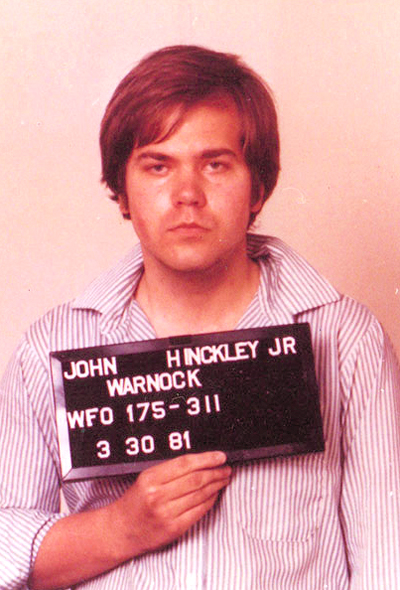Buster
John Hinckley Says He's An Artist And A Musician, Not Just "The Guy Who Tried To Kill Reagan"
In the wake of last year’s shooting of Rep. Gabrielle Giffords by accused gunman Jared Loughner, John Hinckley asked one of his therapists, “Wow. Is that how people see me?”
When asked by music therapist Verne Hyde if he thought that was, in fact, the public’s perception of him, Hinckley, who sought to assassinate President Ronald Reagan in 1981, replied, “Yeah, I think that they do.”
 Hinckley, 56, then began to vent his frustrations, according to a November 2011 forensic psychiatric report prepared in connection with Hinckley’s request for expanded privileges at St. Elizabeths Hospital, the Washington, D.C. psychiatric facility where he has lived for the past 30 years.
Hinckley, 56, then began to vent his frustrations, according to a November 2011 forensic psychiatric report prepared in connection with Hinckley’s request for expanded privileges at St. Elizabeths Hospital, the Washington, D.C. psychiatric facility where he has lived for the past 30 years.
“It’s impossible for me to change that. I don’t have a microphone in my hand. I don’t have the video camera. So no one can hear my music. No one can see my art,” said Hinckley, who writes songs, plays guitar, and paints landscapes. “I have these other aspects of my life that no one knows about. I’m an artist. I’m a musician. Nobody knows that.”
Hinckley then told Hyde, “They just see me at the guy who tried to kill Reagan.”
A second November 2011 psychiatric evaluation notes that a keyword search on a computer in the hospital library (which was used by Hinckley and others) showed hits for Jodie Foster, Reagan, the movie “Taxi Driver,” variations on the word “assassinate,” and the 2011 film “The Beaver,” which was directed by Foster (with whom Hinckley claims he is no longer obsessed).
Additionally, searches were conducted for the names of several women with whom Hinckley has carried on romantic relationships with while hospitalized, three Beatles, the 2011 book “Rawhide Down,” which reconstructed the day Hinckley shot Reagan outside the Washington Hilton, and killers Ted Bundy and Charles Manson.
When questioned about the hits, Hinckley denied responsibility for the searches. “All I can tell you is I didn’t type in Ronald Reagan or Jodie Foster or any of these names,” he told a psychiatrist. Asked specifically about Bundy and Manson, Hinckley answered, “Hell no.” He added, “Give me a little more credit than that, please.”
The two psychiatric reports were filed this month in U.S. District Court in Washington, D.C., where a federal judge is expected to soon decide whether to expand the number of unsupervised visits Hinckley can make to his mother’s home in Williamsburg, Virginia. Federal prosecutors oppose any expansion of his release privileges.

